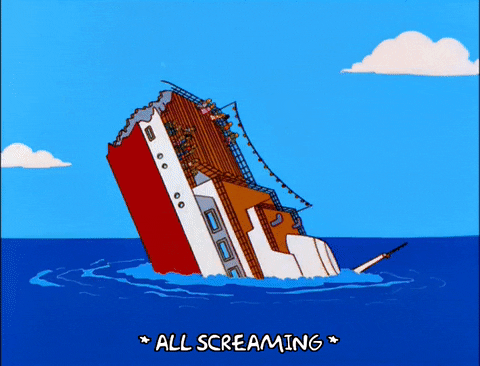5 Mistakes To Avoid That Could Sink Your Startup

As you’ve probably been warned before, 4 startups out of 10 reportedly don’t make it to their fifth birthday. Failure is not as bad as it may sound: they say you either win or you learn! Founder whose companies went down the wrong path before, shared their learning outcomes in a recent report by CBInsights, uncovering the main reasons for startup failure.
Many specific reasons were attributed to the failure, and of course the particular circumstances are always crucial to each single case. However, we tried to group these reasons in five main areas of concern, that every Founder should always keep under control at the starting stage of their business.
1. Market
According to CBInsights, as much as 42% of failed startups mentioned the lack of an actual market need for their product as the main cause for their failure. That makes sense of course, you can’t sell a product that nobody actually wants, then why do so many Founders fall into this trap?
The answer is, probably, that a lot of them start a business to solve a problem that THEY have, without really checking if that problem is common and relevant in the market.
Preliminary market research could help you figure out how relevant the issue you are trying to address really is. The issue with market research, though, is that not only it is very hard to carry out properly: sometimes, as Henry Ford said, the customer doesn’t know what they want until you’ve shown them.
As if identifying a market need wasn’t hard enough, you also have to think about timing. In 13% of the failures examined, timing was deemed as a determining factor.
This can happen in a variety of ways: sometimes you might go to market too soon, while the right technology for your customers is not quite there (think Sega’s Dreamcast); sometimes you have an awesome product, but just get there too late to beat your market’s incumbent (think Microsoft’s Zune).
2. Cash
Among failed startups, three out of ten founders mentioned “lack of cash” as a main cause for their misfortunes. This can be linked to a number of issues that early-stage companies often face.
Firstly, a lot of small companies struggle getting core clients to pay invoices on time. This, of course, is also a matter of bargaining power – it’s hard to negotiate when you’re the new kid on the block – but a solid credit check of your main clients can make your company a whole 30% more likely to survive its first year!
Pricing and cost structure is also one of the main reasons for poor cash flow, according to 19% of failing founders. This can be the result of two different (sometimes avoidable) mistakes.
When designing your business model, make sure your company is not a cash burner. It is fair to rely on investment at pre-revenue stage, but it is also important to keep in mind that investment is uncertain and extra expenses can arise at any time.
Conversely, when working out the pricing structure for your product, you should never start from what your company needs to make money, but always with what is the actual value of your product to the customer.
Finally, 8% of failed startups attributed significant responsibility to lack of funding from investors, mostly at the seed follow-on stage (aka The Series A Crunch).
3. Team
We can’t stress this enough. Early-stage companies are just as valuable as their talent. One in four founders said their business went bust exactly for this reason. The lack of crucial skills and expertise in the founding team led their company to its failure.
After failing after just 3 years of trading, recruitment portal Standout Jobs released a statement saying
“…The founding team couldn’t build an MVP on its own. That was a mistake. If the founding team can’t put out product on its own (or with a small amount of external help from freelancers) they shouldn’t be founding a startup. We could have brought on additional co-founders, who would have been compensated primarily with equity versus cash, but we didn’t.”
Ben Yoskovitz
Is is worth remarking Ben’s comment about being able to bring on early-stage talent in exchange for equity rather than cash. That’s what EMI Share Options are for and they can make the difference between a winning and a losing team.
Other common causes of failure related to the workforce were “disharmony” among the stakeholders. Including co-founders with different visions or opposite approaches to their job. However, several founders also found quite the opposite, saying that had they been able to rely on someone with a different view for a “sanity-check”, the fate of their business would have been more fortunate.
Finally, 8% of founders admitted their failure was a result of a lack of passion towards their business vision or sector. Although this can seem counter-intuitive, keep in mind that startups often employ their knowledge in a specific sector (think Engineering, Software, Branding) to solve an issue in a completely different market. It is important that the founding team is passionate about the purpose of the business, not only about their product.
4. Customers
Jeff Bezos famously wrote to his shareholders in 1999 that he often reminded employees to be constantly terrified of their customers. Turns out he was right (don’t be shocked), as almost 1 founder in 5 said they failed because their product was not user-friendly enough.
A further 14% regretted not listening to their customers – in particular, feedback from early prospects – while they kept working on a product that they liked, ignoring the actual needs of their target market.
Finally, 14% said that despite having a good product solving a real problem, they were unable to deliver it to their target, as they struggled communicating to the selected audience through marketing channels. Many of them recommended hiring marketing staff early on in the company development, in order to be ready to bring your product to larger audiences and scale.
5. Business Model
Lack of a sufficient business model and inability to pivot and scale are the last major reason for startups to fail. Building a great product can be meaningless without a solid and scalable business model to support it.
Volumes outgrowing suppliers or capacity, insufficient revenue streams, being overly dependent on a single delivery channel or failing to expand geographically are all mistakes that could have easily been avoided with a more careful consideration of a business model.
Moreover, a good business model needs to be flexible and ready to pivot when needed. Focusing on a company’s resources and value adding activities, rather than on one single value proposition, can be essential to respond to a changing environment. As much as 17% of founders said their business failed because they didn’t manage to pivot quickly or well enough.
There’s more!
Obviously, there are many more reasons why your company could fail – we don’t mean to scare you, just to warn you!
Some commonly mentioned ones are competition (you should always evaluate your competitors with a thorough market analysis), legal issues and consequent costs (which can be quite difficult to foresee), failure to leverage on your network, or just burning out (please maintain a healthy work-life balance!).
Of course, it’s really hard to succeed as a startup founder. It can be tough and lonely, always uncertain and often frustrating. However, we are here to help. Our vCFOs can help you avoid many of these mistakes and support your business take off and scale. Don’t hesitate to get in touch!
The information available on this page is of a general nature and is not intended to provide specific advice to any individuals or entities. We work hard to ensure this information is accurate at the time of publishing, although there is no guarantee that such information is accurate at the time you read this. We recommend individuals and companies seek professional advice on their circumstances and matters.




